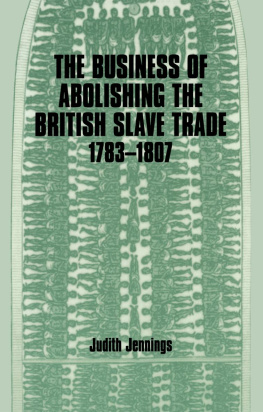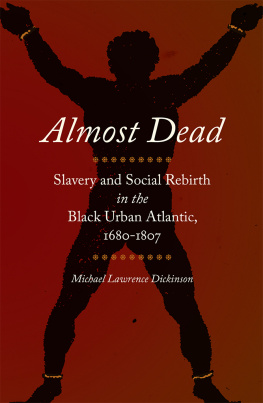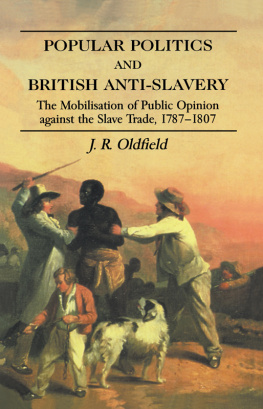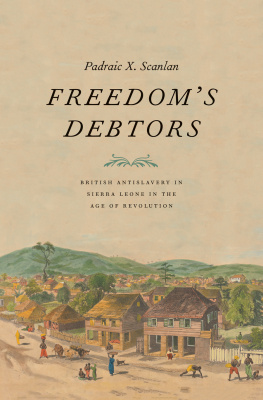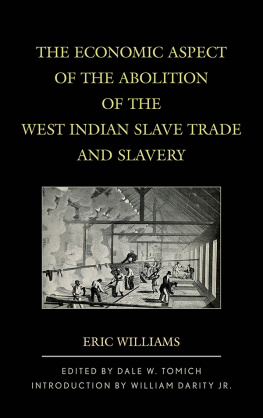First published in 1997 in Great Britain by
Routledge
2 Park Square, Milton Park, Abingdon, Oxon, OX14 4RN
270 Madison Ave, New York NY 10016
Transferred to Digital Printing 2006
Copyright 1997 Routledge
British Library Cataloguing in Publication Data
The business of abolishing the British slave trade,
1783-1807
1. Slavery - Great Britain - History 2. Slavery - Law and
legislation - Great Britain - History
I. Jennings, Judith
306.3620941
ISBN 0-7146-4697-0 (cloth)
ISBN 0-7146-4235-5 (paper)
Library of Congress Cataloging-in-Publication Data
The business of abolishing the British slave trade, 1783-1807 /
by Judith Jennings.
p. cm.
Includes bibliographical references (p. ) and index.
ISBN 0-7146-4679-0 (cloth). -- ISBN 0-7146-4235-5 (paper)
1. Woods, Joseph--Views on slavery. 2. Hoare, Samuel-Views on
slavery. 3. Harrison, George, 1747?-1827--Views on slavery.
4. Phillips, James, bookseller--Views on slavery. 5. London
Abolition Committee--History--Sources. 6. Antislavery movements
--Great Britain--History--Sources. 7. Quaker abolitionists--Great
Britain--History--Sources. 8. Slave-trade--Great Britain--History
-Sources. I. Jennings, Judi, 1947
HT1162.B87 1997
380.14409042--dc20
96-27425
CIP
All rights reserved. No part of this publication may be reproduced, stored in a retrieval system or transmitted in any form or by any means, electronic, mechanical, photocopying, recording or otherwise, without the prior permission of Routledge
Publishers Note
The publisher has gone to great lengths to ensure the quality of this reprint but points out that some imperfections in the original may be apparent
I wish to acknowledge the support and encouragement of Professors David Brion Davis and Seymour Drescher. Both of these outstanding scholars found time to answer my inquiries and provide valuable advice. Professor James Walvin read the manuscript twice and provided excellent editorial suggestions.
The mosaic of manuscript materials presented here is a tribute to the patience of many librarians and archivists. Special thanks go to Malcolm Thomas, Librarian at Friends House, for his friendship and assistance. The staff of the Public Record Office and the British Library in London, the Library Company and American Philosophical Society in Philadelphia and the Benjamin Franklin Papers at Yale were always pleasant, professional, and helpful.
Professor Carl Cone of the University of Kentucky, a true gentleman and scholar, directed my dissertation, my first study of abolition. I received early advice and encouragement from Professor Ian Christie and especially from Professor John Dinwiddy in the Eighteenth Century Seminar at the Institute of Historical Research.
I want also to acknowledge the life-long support of my mother, Dorothy Hornsby Jennings Hornbeck, who always firmly believed that I could do anything, including writing something new about the British slave trade. This book is dedicated to her.
The British slave trade was abolished by Act of Parliament on 25 March 1807, and historians have been trying to explain why ever since. In 1808, Thomas Clarkson, an abolitionist, published his History of the Rise, Progress and Accomplishment of the Abolition of the African Slave Trade. Clarkson identified scores of early opponents of slavery and the slave trade beginning in 1516 and continuing until the founding of the London Abolition Committee in 1787. He then focused on the role of the London Abolition Committee, giving special emphasis to his own activities and the interaction of the Committee with William Wilberforce and other Parliamentary leaders including Charles James Fox and Wilberforce's evangelical allies.
Wilberforce's sons, Robert and Samuel, later wrote a biography of their father stressing the key role of his leadership and that of other evangelical Members of Parliament in the success of abolition. Since then, many historians have focused their attention almost exclusively on Wilberforce and the evangelicals of the Clapham Sect.
In 1944, Eric Williams 'challenged the entire frame of reference' of abolition historiography by writing Capitalism and Slavery 'linking the rise and fall of slavery with two consecutive phases of capitalism, mercantile and industrial.'
The publication of the two-volume study by David Brion Davis, The Problem of Slavery in Western Culture and The Problem of Slavery in the Age of Revolution, in 1966 and 1975, opened the doors of abolition historiography even wider and inaugurated a remarkably rich era of new scholarship. Drawing on both Marx and Freud, Davis argues that Anglo-American Quakers 'pioneered the development of abolition into a broader social movement' and 'simultaneously forged an ideological defense, albeit unconsciously, of the emergent capitalist industrial order'.
Today, established historians are working fruitfully in many fields of abolition historiography. Some, like Seymour Drescher and David Eltis, analyse the profitability of slavery and the slave trade. Their work proves that abolition occurred at a time when profits from the slave trade were increasing and sales of slave products were on the rise. Professor Drescher
Roger Anstey synthesized the politics of abolition in The Atlantic Slave Trade and British Abolition, 1769-1810. In England, Slaves and Freedom and other essays and books, James Walvin continues the process of political analysis and shows how abolition related to other reform movements of the late eighteenth and early nineteenth centuries.
Scholars are now adding fresh insights and new fields of enquiry to the already rich historiographicai mix of abolition. In Britons: Forging the Nation, 1707-1837 , Linda Colley looks at the connections between antislavery and the development of British national identity. In her path-breaking study, Colley shows how abolition is situated within the context of 'the invention of Britishness' and the 'evolution of British nationalism'.
In The Culture of English Antislavery, 1780-1860 , David Turley carefully delineates the complex components of anti-slavery that made it a multi-layered and dynamic culture shaping and shaped by all those participating in abolition. As Turley shows, anti-slavery was not a simple linear development but a series of complex attitudes in an uneven process of change.
From this wealth of research, it is becoming clear that abolition was part of complex and global political, economic, social and intellectual currents. Abolition both represented and stimulated what Seymour Drescher calls 'profound changes in historical and moral frames of reference as well as in political and economic institutions'.
Given this global view and the breadth and depth of recent research, it is not surprising to find, as Seymour Drescher says, many anti-slaveries. 'There were anti-slave trade, anti-black, humanitarian, egalitarian, religious and secular variants', as Drescher shows, 'sometimes operating separately and sometimes in tandem or tension'.
What is still missing in the historiography of abolition is, as David Brion Davis first pointed out in 1975, information about the day-to-day writings and activities of the individual abolitionists who formed local committees and organized grassroots support. The current study selects four Quaker founders of organized abolitionism in Great Britain and examines their writings and activities throughout their lifetimes, spanning the period from the mid-1700s to the early 1800s.

